正式写作中应避免的10个单词
- 格式:docx
- 大小:18.72 KB
- 文档页数:2
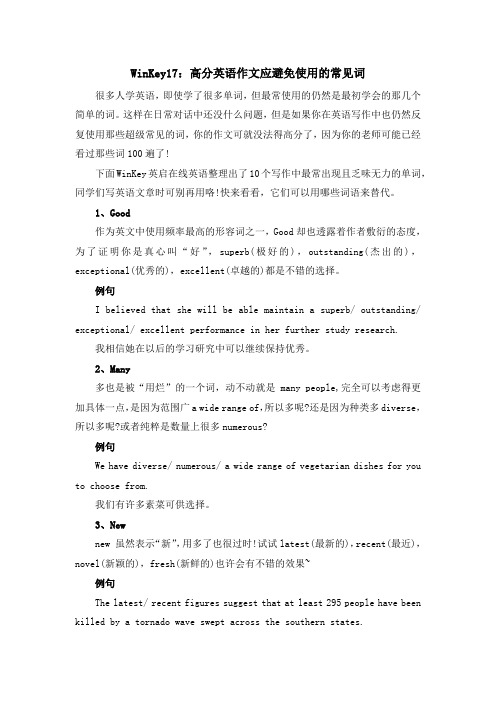
WinKey17:高分英语作文应避免使用的常见词很多人学英语,即使学了很多单词,但最常使用的仍然是最初学会的那几个简单的词。
这样在日常对话中还没什么问题,但是如果你在英语写作中也仍然反复使用那些超级常见的词,你的作文可就没法得高分了,因为你的老师可能已经看过那些词100遍了!下面WinKey英启在线英语整理出了10个写作中最常出现且乏味无力的单词,同学们写英语文章时可别再用咯!快来看看,它们可以用哪些词语来替代。
1、Good作为英文中使用频率最高的形容词之一,Good却也透露着作者敷衍的态度,为了证明你是真心叫“好”,superb(极好的),outstanding(杰出的),exceptional(优秀的),excellent(卓越的)都是不错的选择。
例句I believed that she will be able maintain a superb/ outstanding/ exceptional/ excellent performance in her further study research.我相信她在以后的学习研究中可以继续保持优秀。
2、Many多也是被“用烂”的一个词,动不动就是many people,完全可以考虑得更加具体一点,是因为范围广a wide range of,所以多呢?还是因为种类多diverse,所以多呢?或者纯粹是数量上很多numerous?例句We have diverse/ numerous/ a wide range of vegetarian dishes for you to choose from.我们有许多素菜可供选择。
3、Newnew 虽然表示“新”,用多了也很过时!试试latest(最新的),recent(最近),novel(新颖的),fresh(新鲜的)也许会有不错的效果~例句The latest/ recent figures suggest that at least 295 people have been killed by a tornado wave swept across the southern states.最新数据显示在龙卷风席卷这个位于美国南部的州之后,至少有295人已经死亡。
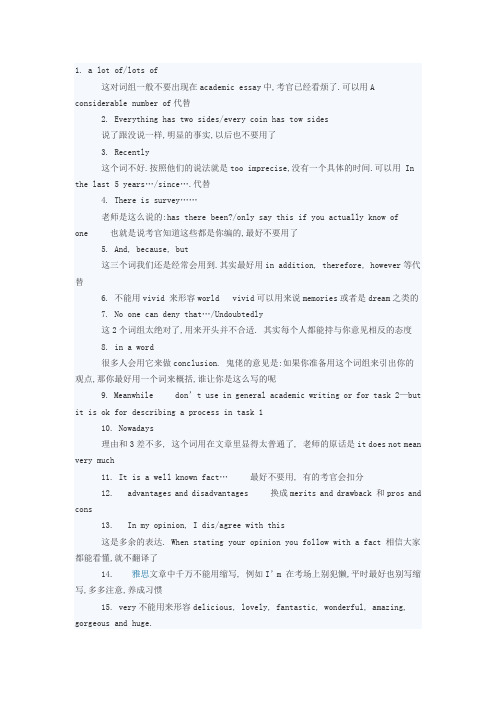
1. a lot of/lots of这对词组一般不要出现在academic essay中,考官已经看烦了.可以用A considerable number of代替2. Everything has two sides/every coin has tow sides说了跟没说一样,明显的事实,以后也不要用了3. Recently这个词不好.按照他们的说法就是too imprecise,没有一个具体的时间.可以用 In the last 5 years…/since….代替4. There is survey……老师是这么说的:has there been?/only say this if you actually know of one 也就是说考官知道这些都是你编的,最好不要用了5. And, because, but这三个词我们还是经常会用到.其实最好用in addition, therefore, however等代替6. 不能用vivid 来形容world vivid可以用来说memories或者是dream之类的7. No one can deny that…/Undoubtedly这2个词组太绝对了,用来开头并不合适. 其实每个人都能持与你意见相反的态度8. in a word很多人会用它来做conclusion. 鬼佬的意见是:如果你准备用这个词组来引出你的观点,那你最好用一个词来概括,谁让你是这么写的呢9. Meanwhile don’t use in general academic writing or for task 2—but it is ok for describing a process in task 110. Nowadays理由和3差不多, 这个词用在文章里显得太普通了, 老师的原话是it does not mean very much11. It is a well known fact…最好不要用, 有的考官会扣分12. advantages and disadvantages 换成merits and drawback 和pros and cons13. In my opinion, I dis/agree with this这是多余的表达. When stating your opinion you follow with a fact 相信大家都能看懂,就不翻译了14. 雅思文章中千万不能用缩写, 例如I’m 在考场上别犯懒,平时最好也别写缩写,多多注意,养成习惯15. very不能用来形容delicious, lovely, fantastic, wonderful, amazing, gorgeous and huge.16. human being MS这个词指的是动物+植物, 以后可以用man kind代替阅读理解里做题,做到只要出现极端词汇的题,99%都是错的——相信无论是应试还是别个老师一定说过这句话。
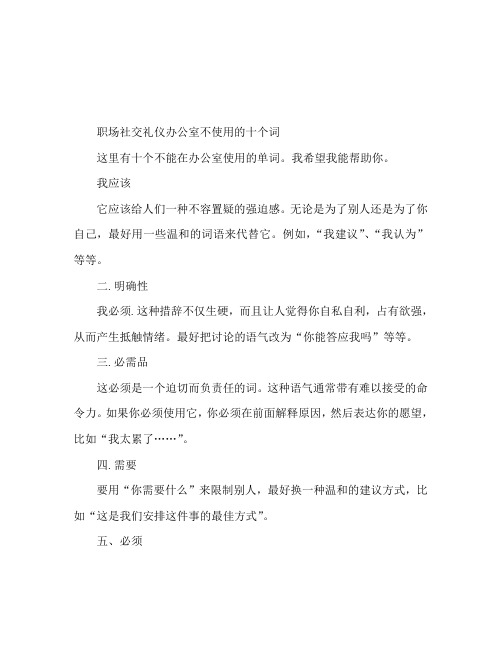
职场社交礼仪办公室不使用的十个词这里有十个不能在办公室使用的单词。
我希望我能帮助你。
我应该它应该给人们一种不容置疑的强迫感。
无论是为了别人还是为了你自己,最好用一些温和的词语来代替它。
例如,“我建议”、“我认为”等等。
二.明确性我必须.这种措辞不仅生硬,而且让人觉得你自私自利,占有欲强,从而产生抵触情绪。
最好把讨论的语气改为“你能答应我吗”等等。
三.必需品这必须是一个迫切而负责任的词。
这种语气通常带有难以接受的命令力。
如果你必须使用它,你必须在前面解释原因,然后表达你的愿望,比如“我太累了……”。
四.需要要用“你需要什么”来限制别人,最好换一种温和的建议方式,比如“这是我们安排这件事的最佳方式”。
五、必须这种表达让人感到非常消极。
当你不得不做某事时,你通常会被迫去做。
最好提醒自己“我想做”或者“我能做”。
六,不行不能肯定拒绝,这样的语言就像关门一样,挡住了许多可能的机会。
用“也许”和“也许”这样的词代替它会给你更多的选择。
七,不可能这个世界上没有什么不可能的,所以让我们少谈像这样的话。
如果那天不可能的事情变成了可能,那么你就是在搬起石头砸自己的脚。
少用一点来避免很多尴尬。
八,从来没有“永远”这个词太难了,很容易伤害别人的感情。
即使一百个人心里不想,口头上最好找个委婉的说法拒绝。
九,闭嘴闭嘴,要暴力。
它会反映你的负面情绪。
在表达你的观点之前,你最好先说出原因,然后加上“请”这个词。
不要直接说出来。
十,你不介意吧如果有人好心帮助你,但你却冷到拒绝别人的好意,那会让人觉得你没有人情味,在拒绝之前会感谢或肯定对方。
这10个词不能在办公室使用。
我希望他们能帮助你。
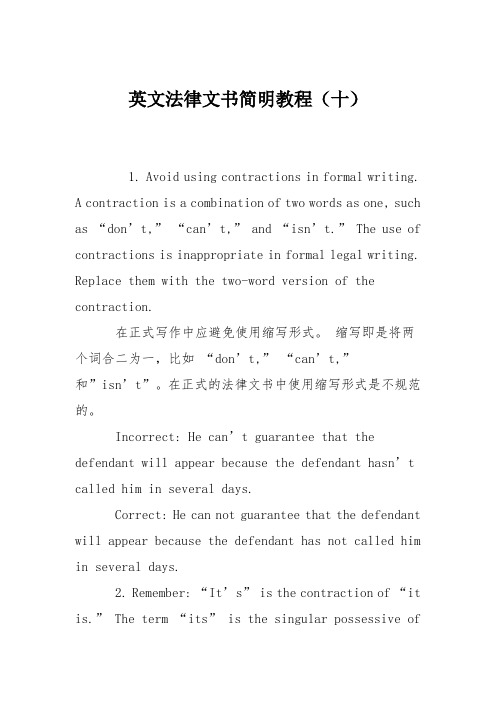
英文法律文书简明教程(十)1. Avoid using contractions in formal writing.A contraction is a combination of two words as one, such as “don’t,” “can’t,” and “isn’t.” The use of contractions is inappropriate in formal legal writing. Replace them with the two-word version of the contraction.在正式写作中应避免使用缩写形式。
缩写即是将两个词合二为一,比如“don’t,” “can’t,”和”isn’t”。
在正式的法律文书中使用缩写形式是不规范的。
Incorrect: He can’t guarantee that the defendant will appear because the defendant hasn’t called him in several days.Correct: He can not guarantee that the defendant will appear because the defendant has not called him in several days.2. Remember: “It’s” is the contraction of “it is.” The term “its” is the singular possessive of“it.” The term “it’s,” by contrast, is the contraction of “it is.”记住:“It’s”是“it is”的缩写形式,而“its”是“it”的单数所有格形式。
Correct use as Possessive: 所有格的正确使用:My ‘68 Mustang is on its last journey.Correct use as Contraction: 缩写形式的正确使用:It’s a long way from Tipperary.Cross References: Apostrophes, Possessives 参考:省略符号,所有格。

13个禁止使用的单词作为一名职业写手,我们需要掌握流畅、简洁、易懂的语言表达,以便让读者更容易理解我们的观点。
然而,在日常写作和交流中,我们往往不自觉地使用了某些具有负面效果的词汇。
下面列举了13个禁止使用的单词,以帮助我们改进语言表达。
一、引言在我们开始讨论13个禁止使用的单词之前,我们需要明白一个道理:语言是沟通的工具,它的目的是传递信息、交流思想和情感。
因此,在使用语言时,我们应该遵循一定的规范,使之更具可读性和实用性。
二、禁止使用的13个单词及其含义1.滥用词汇:一些人在写作时,为了显示自己的词汇量,不恰当地使用了一些高级词汇。
这样的词汇在适当的时候可以使用,但滥用则会让人感到生硬和不自然。
2.歧视性用词:某些词汇具有歧视性,如对特定群体的贬低或侮辱。
我们在表达时应注意避免使用这类词汇,以免引起他人的反感。
3.侮辱性词汇:侮辱性词汇直接伤害了他人的尊严,无论是在书面表达还是口头交流中,都应坚决避免使用。
4.过时词汇:过时的词汇会让读者感到与时代脱节,写作时应尽量使用现代词汇。
5.模糊不清的词汇:使用模糊不清的词汇会导致读者无法准确理解我们的意图,如使用“大概”、“也许”等词汇。
6.过于正式的词汇:过于正式的词汇会让人觉得疏远,不利于沟通。
在适当的场合,我们可以使用一些口语化的表达。
7.滥用缩写和缩略词:虽然缩写和缩略词可以提高表达效率,但滥用则会让人感到混乱和不规范。
8.滥用标点符号:正确使用标点符号是提高可读性的关键,滥用则会破坏文本的连贯性。
9.网络流行语:网络流行语具有一定的时效性和局限性,过度使用会让读者感到与现实脱节。
10.行业术语:在跨行业交流中,过度使用行业术语会导致沟通不畅。
11.生僻词汇:生僻词汇虽然可以显示知识水平,但过多使用会让读者感到晦涩难懂。
12.带有情感色彩的词汇:在客观表达观点时,应避免使用带有情感色彩的词汇,以免影响读者判断。
13.具有地域特色的词汇:在跨地域沟通中,使用具有地域特色的词汇可能会引起误解。
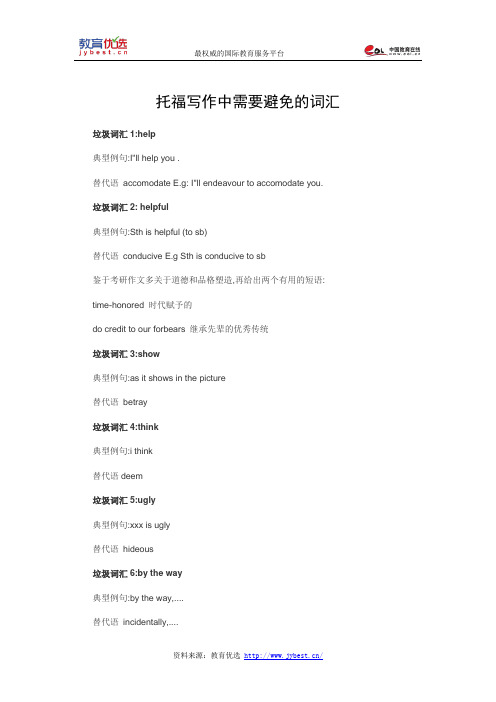
托福写作中需要避免的词汇垃圾词汇1:help典型例句:I"ll help you .替代语accomodate E.g: I"ll endeavour to accomodate you.垃圾词汇2: helpful典型例句:Sth is helpful (to sb)替代语conducive E.g Sth is conducive to sb鉴于考研作文多关于道德和品格塑造,再给出两个有用的短语: time-honored 时代赋予的do credit to our forbears 继承先辈的优秀传统垃圾词汇3:show典型例句:as it shows in the picture替代语betray垃圾词汇4:think典型例句:i think替代语deem垃圾词汇5:ugly典型例句:xxx is ugly替代语hideous垃圾词汇6:by the way典型例句:by the way,....替代语incidentally,....垃圾词汇7: because典型例句:xxx because xxx替代语in that/in as much as E.g: xxx because xxx垃圾词汇8: consider典型例句: We must consider xxx替代语: allow for E.g : We must allow for xxx垃圾词汇9: much典型例句: there has been a much increase in the world population替代语:there has been a drastic increase in the -----垃圾词汇10: about典型例句:it is about 250 times of that替代语it is approximately ---垃圾词汇11: buy替代语purchase这样对比新旧托福作文之后感觉就是有所不同,希望同学们可以学习,对托福写作有帮助。
1. 在科技论文写作中应避免的语言●双关语(puns),笑话,口语中的缩略形式●bad, good, nice, terrible, stupidA scientific essay does not make moral judgement.Incorrect/correct来说明正确或错误,用具体的词或短语来评价品质或优劣。
应避免所有带有强烈主观色彩的、定性的评判。
●true, pure当用来表达“good”之意时,为主观评判性的。
●perfectNothing is.●new, fast避免使用此类非定量定性的、含宽泛的词和一般性的术语。
Ultrasonic(超音速的), cutting-edge(最前沿的),就更精确和符合学术规范。
用词应力求符合专业规范,有特定的指示性,或能定量定性的词●an ideal solution.Judging again.●today, modern times, soon不是具体的、绝对的时间表述●We were surprised to learn…真的有必要知道你们的惊讶之情吗?●…would seem to show…所表述的必须是事实。
●Seems, seemingly (看起来好像,看来)●in terms of通常会被认为表意含糊●based on, X-based, as the basis of有时会被认为表意含糊●different≠various, different than what?●in light of (按照,根据), due to口语●lots of, kind of, type of, something like, just about含糊,口语化●number of含糊,究竟是some,many, most?量化的表述更可取。
●be careful when using “few, most, all, any, every”Not precise.●probably除非真的知道具体的统计概率(statistical probability)量化的表述更合适●obviously, clearlyto every?●simple有贬义,“simpleton(头脑简单的人,傻瓜)”●along with用with即可●actually, really, the fact that具体、详尽地界定、解释了某术语或现象,就没有必要再度澄清●this, that模棱两可,表意含糊。
2019-雅思写作高分应当避免的16个词组-推荐word版本文部分内容来自网络整理,本司不为其真实性负责,如有异议或侵权请及时联系,本司将立即删除!== 本文为word格式,下载后可方便编辑和修改! ==雅思写作高分应当避免的16个词组下面雅思为大家整理了雅思写作高分应当避免的16个词,供考生们参考,以下是详细内容。
有很多词组在雅思作文中是大家经常用到的,但是有一些并不适合出现在雅思作文中。
如果大家想要自己的雅思写作拿到高分,就要注意在作文中避免使用不恰当的词组。
本文为大家整理了16个雅思写作高分避免使用的词组。
1. a lot of / lots of这对词组一般不要出现在 academic essay 中,考官已经看烦了。
可以用A considerable number of 代替。
2. Everything has two sides / every coin has tow sides说了跟没说一样,明显的事实,以后也不要用了。
3. Recently这个词不好。
按照他们的说法就是 too imprecise ,没有一个具体的时间。
可以用 In the last 5 years / since .代替。
4. There is survey老师是这么说的: has there been ?/ only say this if you actually know of one 也就是说考官知道这些都是你编的,最好不要用了。
5. And , because , but这三个词我们还是经常会用到.其实最好用 in addition , therefore ,however 等代替。
6. 不能用 vivid 来形容 world , vivid 可以用来说 memories 或者是dream 之类的。
7. No one can deny that / Undoubtedly。
提高英语作文:英文作文中应避免的词汇1.I think→ argue, insist, claim, maintain, hold, emphasize, guess, I’m sure/ certain/ convinced/positive that, I cherish a belief that, from my perspective, I’m strongly convinced that2.people usually think→ It is generally/ widely/ commonly/ universally believed/ accepted/ thought that3.give→provide sb. with sth, provide sth to/for sb, supply sth with sb, gain, offer sb sth,4.don’t give→deny sb the chance/ opportunity/ right/ assistance/ help/ favor, deprive/ rob/ strip sbof the right5.want to→intend/ expect/ mean/ manage/ propose/ plan/ wish/ dream to, aim at doing, for the purposeof doing, be intended/ meant/ designed/ calculated to6.try to→attempt to, endeavor to, make determined/resolute/ systematic attempts to7.try one’s best→exert great/ considerable/ continuous/ persistent/concerted effort to, do everythingpossible to, spare no efforts/plains to8.decide to→determine to, resolve to9.more and more→a growing/ increasing/ mounting/ soaring number/ amount of, people in ever increasingnumbers, be on the rise/ increase10.many→ a great many, a large number of, a multitude/ host of, enormous11.much→ a large amount of, a great deal of12.a lot of→ a great mass of, plenty of13.very→ most, highly, particularly, extremely, absolutely, abnormally14.important → vital, essential, crucial, significant, indispensable15.solve (the problem)→settle, deal with, cope with, dispose of, address16.face→ confront, fierce challenges/ crisis, be confronted with (face with courage = stand up to)17.don’t face→ escape from, shy away from, run away from reality18.cause→ originate, bring about, give rise to+坏事情, make contribution to19.cause harm to sb→ exert/have a detrimental influence on, pose a threat of, be weighed against, threaten20.now→ currently, in modern/ contemporary society21.yesterday→ in recent/ the past X years/decades22.maybe → perhaps, probably23.popular→ gain/ enjoy high popularity, the acceptance of sth. is on the rise, be regarded as a primary/nation/ growing concern24.for example → for instance, to illustrate, as an illustration, to demonstrate, specifically, say, e.g.25.in other words→ that is to say, to clarify, to explain, to put it in another way26.相同→ also, likewise, similarly, have in common, in the same way, in similar fashion27.相反→ yet, unlike, nevertheless, notwithstanding, nonetheless, otherwise。
10 Words to Avoid in Formal Writing by Richard Nordquist
Updated October 08, 2018
Purists may tell you that many of the words in the list below aren't "really" words at all, but that's misleading at best. A few of the words are simply misspellings, and the rest are informal expressions or slang phrases that frequently appear in everyday speech (or vernacular). Nevertheless, according to the conventions of Standard English, all 10 of the following words should be avoided in reports, essays, research papers, and all other types of formal writing.
1.alot
Alot (one word) is a common misspelling of a lot (two words).
"[W]e all may write alot one day," says The American Heritage
Guide to Contemporary Usage (2005), but for now "keep in mind that alot is still considered an error in print."
2.and etc.
Because the abbreviation etc. (from the Latin et cetera) means
"and so on," and etc. is redundant. In any case, avoid using etc. in your essays: often it gives the impression that you simply can't
think of anything else to add to a list.
3.anywheres
Huck Finn can get away with saying, "There warn't a sound
anywheres," but on formal occasions drop the terminal s.
If anywheres appears anywhere in your dictionary, it's probably
labeled "nonstandard" or "dialectal."
4.could of
Don't confuse this nonstandard form with
the contraction could've. Could of (along with should
of and would of) can and should be replaced by could
have (and should have and would have). As for coulda, shoulda,
woulda, avoid dwelling on them—both in writing and in life.
5.hisself
This alternative form of the reflexive pronoun himself is
commonly heard in certain dialects, but in formal writing steer
clear of hisself (and theirself as well—though both were regarded
as good usage in Middle and Early-Modern English).
6.furtherest
The comparative form of far is farther or further.
The superlative form is farthest or furthest. Nothing's gained by
combining the two forms.
7.irregardless
This double negative (ir- at the beginning and -less at the end) may not deserve Bryan Garner's label of
"semiliterate . . . barbarism," but he's probably right that in print it "should have been stamped out long ago" (Garner's Modern American Usage, 2009). Use regardless instead.
8.its'
Its is a possessive pronoun (like his or her). It's is a contraction of it is or it has. That leaves nothing for its' to do—so toss it.
9.let's us
Let's us means "let us us." To avoid the repetition, write lets ("She lets us play in her yard") or let's ("Let's play in her yard") or let us ("Let us pray").
10.n ohow
If you have the know-how to write, you don't need to be told to avoid nohow. Instead use in no way or not at all.。